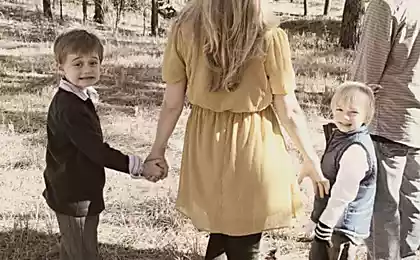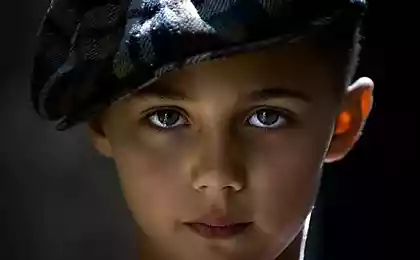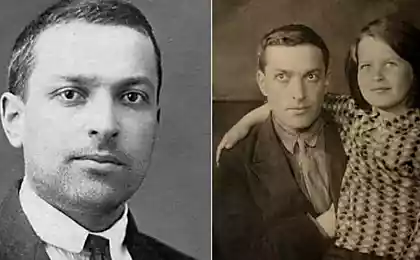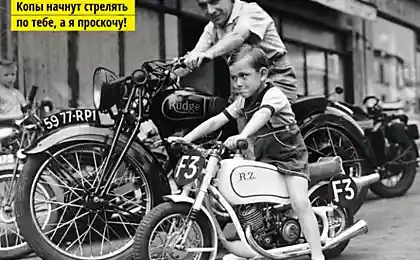775
5 secrets of parenting that make Japanese children dream of any parent
Twelve million nine hundred twelve thousand seven hundred fifty one
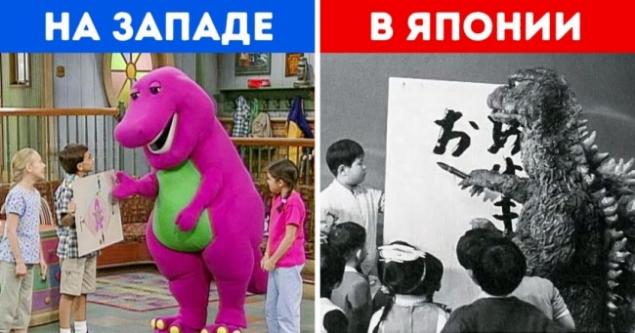
Japanese children admired — they, as a rule, well-mannered, kind, friendly and rarely lose control over their feelings. You can hardly see in Japan the baby, hysterical in the store over a toy (although, of course, of all there are exceptions).
We are in the Website thought that we have something to learn from the Japanese, and gathered the basic principles of their education.

In Japan, the mother and child are very close. This closeness is reflected in everyday life: a mother and baby sleep together, it's quite long carrying a child for yourself — in the old days something like a sling (Obukhiv), and today in its modern counterparts. And on a joint dream, and about wearing your baby you can meet a lot of references in Japanese literature.
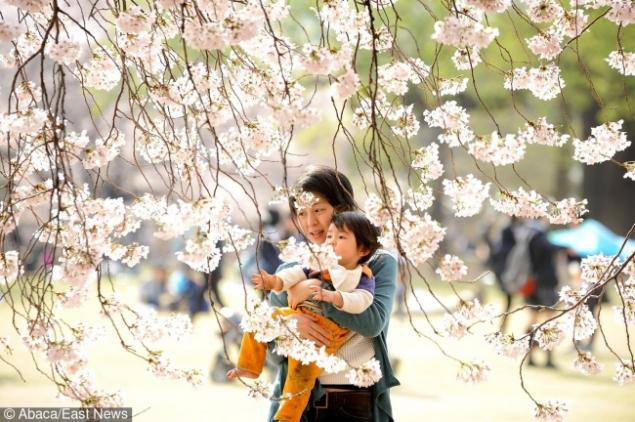
The relationship "mother — child" is reflected on an emotional level: my mother takes everything he does with love, patience and care: a child is perfect for her.
Orientalist G. East at the beginning of last century wrote in his book "Japan and its inhabitants": "No worklist, no rigors; the pressure on children is in such a mild form that it seems as if the children themselves raise, and that Japan is a Paradise for children, where not even the forbidden fruit."
The principle of "ikuji" (the same when the child is "first God, then the servant") provides that up to 5 years kid can do everything. This is not permissiveness and self-indulgence is not, as many foreigners. It is the creation of the child's image of "I am good and love."
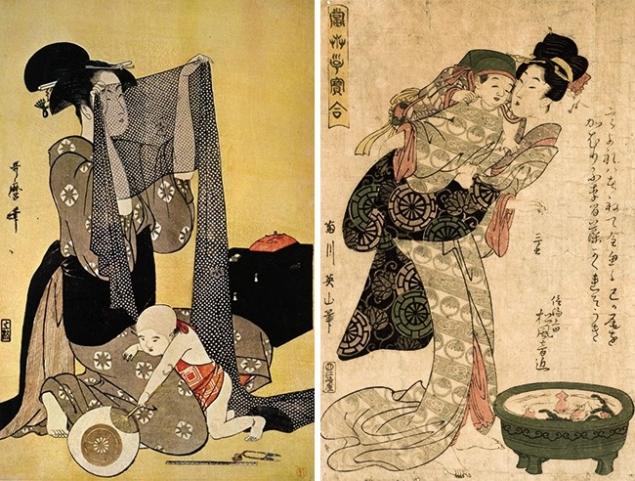
Prints of Japanese artists of the late XVII — early XIX centuries. on the Right: mother and child tied behind her back, admiring the goldfish.
This attitude contributes to the formation of "Amae". Unfortunately there is no word in other languages, and it can be translated as "dependence on love of others," simply put, attachment. "Amae" — the basis of relations between parents and children, and this means that children can rely on parents and their love, and the elderly to obtain the same from adult children. And moms, surrounding children with love and with gentle condescension, accepting their mistakes, form is the "Amae" — a heartfelt connection.
Big and serious study of Japanese and American scientists confirm direct link between good parenting and children's behavior. Researchers say that positive parental attitude not only reduces the number of moods and fights, but also reduces the frequency of attention deficit disorder and the severity of autism spectrum disorders. But strict and severe, on the contrary, increases the risk of abnormalities and problems.

Probably all heard about system of education "ikuji" (child up to 5 years — God is with 5 to 15 — servant, with 15 equal), but many know her very superficially: like 5 all you can, and then nothing, and it's weird.
In fact, the philosophy of "ikuji" aims to educate a member of a collective society, where the interests of the person go by the wayside. This kind of stress, and Japanese parents tend to grow up in such circumstances, a harmonious personality, which will find its place in the system and thus will not diminish its value.
In the first stage ("God") they surround the child with unconditional love and support. In the second stage ("servant") this love is not going anywhere, just the child actively learns to live by the rules of society and strives to take his place in it. While a large impact on the child has a strong attachment to mom, which was formed in the early years, he will try to behave properly, to never have to disappoint her.
Interestingly, in Japanese educational institutions play an important role not only education, but also education and have no competition: no one is better or worse than others.
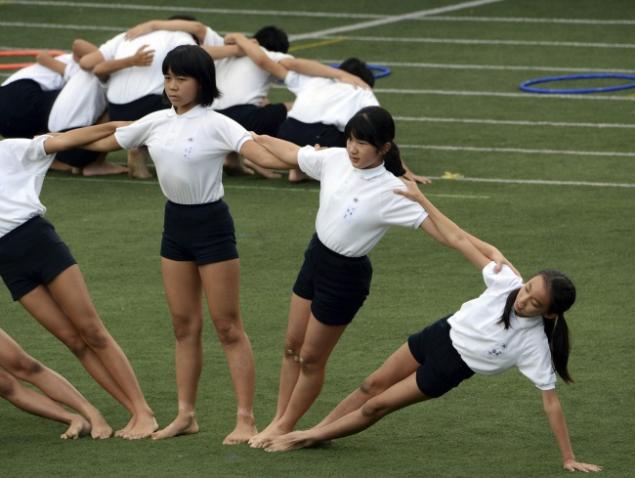
All are equal. Japanese Princess Aiko (second from right) stands with teammates on the school athletic festival in Tokyo.
"In Japan, try not to compare children with each other. The teacher will never mention the best and worst blame, do not complain to parents that their child draws badly or slower than other runs. To allocate someone from the group in Japan is not accepted. No competition even in sports activities — "friendship wins", or at least one of the teams", says the book "Education of Japanese" (authors — experts in the history and culture of Japan who have lived and worked in this country).
In the third phase ("equal"), the child is considered a Mature member of society. Raise it too late, and parents can only reap the fruits of their efforts.

The upbringing of children, as a rule, does mother. She spends with the kids a lot of time — the Japanese believe that before 3 years to give the child to the garden is not worth it. And basically decided to "throw" the kids at grandmas or to use the services of nannies.
But at the same time great importance is attached to the "extended" family: children actively deal with grandmothers, grandfathers and other relatives. The relationship between the generations, full of sensitivity and attention, and to the opinion of the old men, I decided to listen. Family is the inner circle, which is "Amae" and where will always support and care.
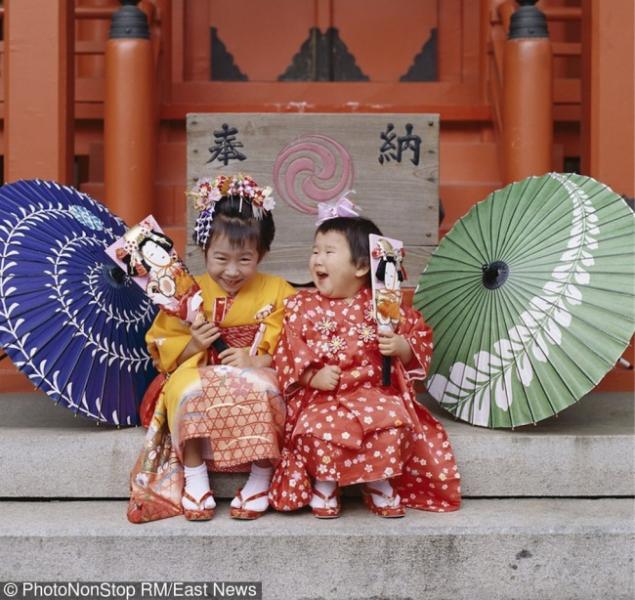
Girls in traditional kimono at the festival of children Shichi-go-San.

Ikeno, Osamu, author of "Japan. How to understand", writes about an interesting experiment. Moms Japanese and European women were asked to put together a pyramid. Japanese mom initially collected themselves pyramid, and then asked the children to repeat. If the kids something did not work, they started all over again.
Mom from Europe most often chose a different tactic: they explained in detail what to do and in what order the units should follow each other. And then offered the child to try. It turns out that mom's from Japan called "do as I do", and West was forced to do everything yourself, giving the theory but not showing by example.
Therefore, the Japanese way of training and education is also called "instructing". Mom rarely children require something directly, insisting on the essential version, as in Europe or Russia. They operate subtly, by showing the example and summing up of the child to the desired behavior.
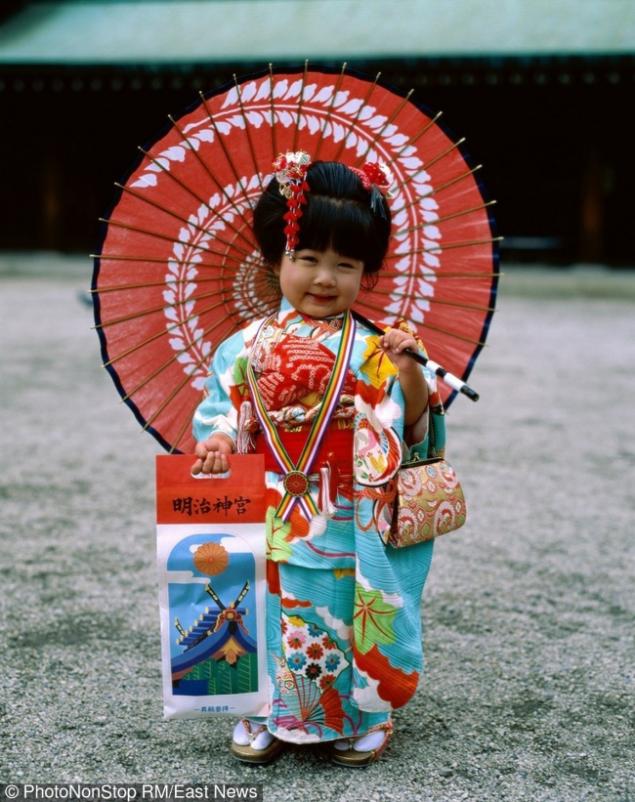

To teach the child to live in a collective society, we must first show him what it means to see and respect the feelings and interests of others.
So the Japanese, in turn, respect the sensitivity of children. They are not under pressure, not ashamed of them too, but rather appeal to the emotions of the kids or even inanimate objects. For example, if a child breaks a machine, the Japanese mother will say: "the Machine in pain, she was going to cry". The European is likely to make such a remark: "Oh, Come on, to do so badly". Yes, I would also add, how much she had to work to buy a toy.
The Japanese themselves do not claim that their methods are the only correct one. And Western values in recent times have a big impact on their traditions. But the head of the Japanese approach — calm, patient, loving attitude towards children. And this is exactly what should learn.
See also
6 principles of education from mommy millionaire
6 tips from Harvard psychologists, who will help raise a confident child
via www.adme.ru/svoboda-psihologiya/6-sovetov-ot-garvardskih-psihologov-po-vospitaniyu-detej-1324415/

Japanese children admired — they, as a rule, well-mannered, kind, friendly and rarely lose control over their feelings. You can hardly see in Japan the baby, hysterical in the store over a toy (although, of course, of all there are exceptions).
We are in the Website thought that we have something to learn from the Japanese, and gathered the basic principles of their education.

In Japan, the mother and child are very close. This closeness is reflected in everyday life: a mother and baby sleep together, it's quite long carrying a child for yourself — in the old days something like a sling (Obukhiv), and today in its modern counterparts. And on a joint dream, and about wearing your baby you can meet a lot of references in Japanese literature.

The relationship "mother — child" is reflected on an emotional level: my mother takes everything he does with love, patience and care: a child is perfect for her.
Orientalist G. East at the beginning of last century wrote in his book "Japan and its inhabitants": "No worklist, no rigors; the pressure on children is in such a mild form that it seems as if the children themselves raise, and that Japan is a Paradise for children, where not even the forbidden fruit."
The principle of "ikuji" (the same when the child is "first God, then the servant") provides that up to 5 years kid can do everything. This is not permissiveness and self-indulgence is not, as many foreigners. It is the creation of the child's image of "I am good and love."

Prints of Japanese artists of the late XVII — early XIX centuries. on the Right: mother and child tied behind her back, admiring the goldfish.
This attitude contributes to the formation of "Amae". Unfortunately there is no word in other languages, and it can be translated as "dependence on love of others," simply put, attachment. "Amae" — the basis of relations between parents and children, and this means that children can rely on parents and their love, and the elderly to obtain the same from adult children. And moms, surrounding children with love and with gentle condescension, accepting their mistakes, form is the "Amae" — a heartfelt connection.
Big and serious study of Japanese and American scientists confirm direct link between good parenting and children's behavior. Researchers say that positive parental attitude not only reduces the number of moods and fights, but also reduces the frequency of attention deficit disorder and the severity of autism spectrum disorders. But strict and severe, on the contrary, increases the risk of abnormalities and problems.

Probably all heard about system of education "ikuji" (child up to 5 years — God is with 5 to 15 — servant, with 15 equal), but many know her very superficially: like 5 all you can, and then nothing, and it's weird.
In fact, the philosophy of "ikuji" aims to educate a member of a collective society, where the interests of the person go by the wayside. This kind of stress, and Japanese parents tend to grow up in such circumstances, a harmonious personality, which will find its place in the system and thus will not diminish its value.
In the first stage ("God") they surround the child with unconditional love and support. In the second stage ("servant") this love is not going anywhere, just the child actively learns to live by the rules of society and strives to take his place in it. While a large impact on the child has a strong attachment to mom, which was formed in the early years, he will try to behave properly, to never have to disappoint her.
Interestingly, in Japanese educational institutions play an important role not only education, but also education and have no competition: no one is better or worse than others.

All are equal. Japanese Princess Aiko (second from right) stands with teammates on the school athletic festival in Tokyo.
"In Japan, try not to compare children with each other. The teacher will never mention the best and worst blame, do not complain to parents that their child draws badly or slower than other runs. To allocate someone from the group in Japan is not accepted. No competition even in sports activities — "friendship wins", or at least one of the teams", says the book "Education of Japanese" (authors — experts in the history and culture of Japan who have lived and worked in this country).
In the third phase ("equal"), the child is considered a Mature member of society. Raise it too late, and parents can only reap the fruits of their efforts.

The upbringing of children, as a rule, does mother. She spends with the kids a lot of time — the Japanese believe that before 3 years to give the child to the garden is not worth it. And basically decided to "throw" the kids at grandmas or to use the services of nannies.
But at the same time great importance is attached to the "extended" family: children actively deal with grandmothers, grandfathers and other relatives. The relationship between the generations, full of sensitivity and attention, and to the opinion of the old men, I decided to listen. Family is the inner circle, which is "Amae" and where will always support and care.

Girls in traditional kimono at the festival of children Shichi-go-San.

Ikeno, Osamu, author of "Japan. How to understand", writes about an interesting experiment. Moms Japanese and European women were asked to put together a pyramid. Japanese mom initially collected themselves pyramid, and then asked the children to repeat. If the kids something did not work, they started all over again.
Mom from Europe most often chose a different tactic: they explained in detail what to do and in what order the units should follow each other. And then offered the child to try. It turns out that mom's from Japan called "do as I do", and West was forced to do everything yourself, giving the theory but not showing by example.
Therefore, the Japanese way of training and education is also called "instructing". Mom rarely children require something directly, insisting on the essential version, as in Europe or Russia. They operate subtly, by showing the example and summing up of the child to the desired behavior.


To teach the child to live in a collective society, we must first show him what it means to see and respect the feelings and interests of others.
So the Japanese, in turn, respect the sensitivity of children. They are not under pressure, not ashamed of them too, but rather appeal to the emotions of the kids or even inanimate objects. For example, if a child breaks a machine, the Japanese mother will say: "the Machine in pain, she was going to cry". The European is likely to make such a remark: "Oh, Come on, to do so badly". Yes, I would also add, how much she had to work to buy a toy.
The Japanese themselves do not claim that their methods are the only correct one. And Western values in recent times have a big impact on their traditions. But the head of the Japanese approach — calm, patient, loving attitude towards children. And this is exactly what should learn.
See also
6 principles of education from mommy millionaire
6 tips from Harvard psychologists, who will help raise a confident child
via www.adme.ru/svoboda-psihologiya/6-sovetov-ot-garvardskih-psihologov-po-vospitaniyu-detej-1324415/
